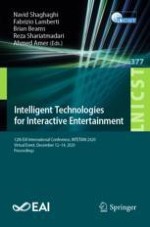2021 | OriginalPaper | Buchkapitel
Acceleration of Therapeutic Use of Brain Computer Interfaces by Development for Gaming
verfasst von : Julia A. Scott, Max Sims
Erschienen in: Intelligent Technologies for Interactive Entertainment
Aktivieren Sie unsere intelligente Suche, um passende Fachinhalte oder Patente zu finden.
Wählen Sie Textabschnitte aus um mit Künstlicher Intelligenz passenden Patente zu finden. powered by
Markieren Sie Textabschnitte, um KI-gestützt weitere passende Inhalte zu finden. powered by
